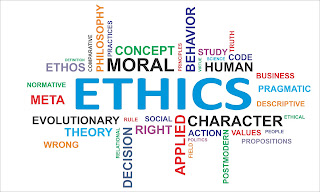In this essay, I shall challenge the morality and ethics of Public Relations as taught in British Universities. I will also briefly consider the extent to which modern transformative technologies will set the ethical bar too high for most professional practice.
Using the emerging blockchain technologies it is now possible for a PR practitioner to distribute content securely. End to end encryption is now available and free.
This means that content created by a practitioner is wholly owned by that practitioner. It can be shared and sold at the discretion of the practitioner. The whole process is more secure than any other form of communication (I argue more so than even word of mouth)
For the recipient, the source of the original copyright is assured. They can now know who contributed towards the information/experiences that they receive.
This content can include concepts, creative ideas and works, designs, text, video, music, tweets, and other social media content plus augmented reality, apps and bots and all of it securely attributed to the originator/s.
Whereas email, fax, messenger and other traditional communication services can be hacked or the origins of the content can be hidden in traditional content sharing structures, the new technologies are for all intents and purposes secure (so far have never been hacked).
The press release in this new environment has value in its original state. Subsequent changes by the author or a client are attributed as they occur. The full activity is available and verifiable from the first ‘key stroke’ to extent that the communication ‘bent the mind of’ recipient.
This means that the practitioner can be paid for the original work; there is no chance that content is Fake News and the quality of practitioner works can be identified without question.
Today the services that enable such capability include Decent (https://decent.ch/), Crypviser (https://ico.crypviser.net/).
Tierion co-founder and CEO wrote: “We see a fundamental problem with the Internet’s trust infrastructure. The root of trust for all systems relies on trusted authorities. Tierion Network makes it possible to create a better Internet where proof replaces trust as the foundation for security.”
Tierion is not alone.
Companies within the Enterprise Ethereum Alliance are also trying to create a decentralised ecosystem and platforms with which organisations can securely communicate with each other without the necessity of intermediaries and manual labour.
This is not something for ‘the future’. It is here now.
My first question to teachers of PR is simple. Can we avoid up close and personal attention to these transformative technologies? Is it ethical to ignore the extent of change now upon us?
Meanwhile, can a practitioner hide behind old technologies when other practitioners are building a reputation for verifiably true and authentic excellence?
I continue with my second concern. In an industry which is one of the older examples of the gig economy would it be ethical to withhold an opportunity for practitioners to achieve a true return for their works for want of knowledge about services such as Decent? The upside is very good. If such technologies can be used to assure full attribution and immediate payment should knowledge and practical experience of such services be withheld for want of knowledge on the part of teachers?
Next, one might ask if the student (and the PR industry) understands the pressure such technologies will put them under. Challenges of speaking truth to power will soon be re-enforced in the knowledge that without it, technologies will wield a digital stick by showing up the charlatans. Such strictures will be of the algorithm and not a person/activist/competitor using technologies (for example trying to ‘fix’ elections) or ‘social media’.
Obfuscation is also under pressure. The technologies are beginning to be the arbiters of the source of and extent of verifiable truths. This is not Artificial Intelligence at play (yet) it is the simple fact of the outcomes from verifiable and trusted communication.
Without such knowledge, can there be a trusted relationship between academic PR and the PR industry?
Already, we have to face hard questions. Does PR have to be completely ethical? Will practitioners always be found out if they stray? Is there room to err? Is the PR academic research able to seek answers to such questions and be able to advise the PR industry?
Can a university pretend to teach PR if it cannot answer such questions?

No comments:
Post a Comment